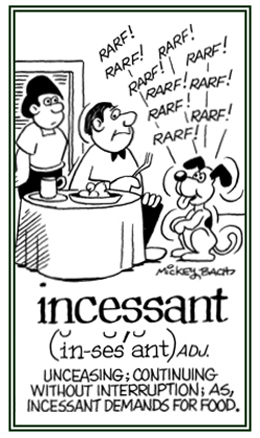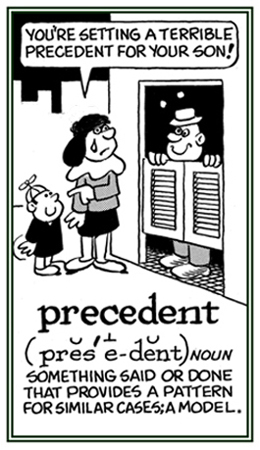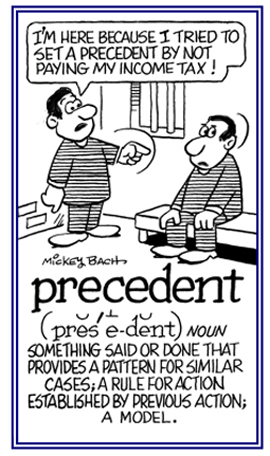-cede, -ceed, -cess, -cease
(Latin: to be in motion; to go, to go away, to yield, to give up, to withdraw)
inaccessibly
1. Characterized by being unable to be reached or used.
2. A reference to being difficult to understand or appreciate.
3. Relating to not being open to advances or influence; unapproachable.
2. A reference to being difficult to understand or appreciate.
3. Relating to not being open to advances or influence; unapproachable.
incessant (adjective), more incessant, most incessant
Characteristic of something that continues for a long time without stopping; usually, in a way that is annoying to others: Sometimes Julia's supervisor has incessant demands that were putting so much pressure on her and her colleagues that they were beginning to feel upset.

© ALL rights are reserved.
Go to this Word A Day Revisited Index

Go to this Word A Day Revisited Index
so you can see more of Mickey Bach's cartoons.
incessantly
1. Relating to continuing something without pausing or not interrupting a process or procedure.
2. In an incessant manner; not ceasing or stopping.
2. In an incessant manner; not ceasing or stopping.
intercede (verb), intercedes; interceded; interceding
1. To plead with someone in authority on behalf of somebody else; especially, a person who is to be punished for something: James spoke up for his friend Sam and interceded in the dispute when Sam was being blamed for stealing the watch, which he didn't.
2. To speak in support of someone involved in a dispute: Brad interceded in the argument between his mother and sister saying that he was responsible for breaking the vase, not his sister Mary.
3. To attempt to settle or to reconcile a disagreement between other people; to mediate: The negotiator was called upon to intercede when the two boys in school had a bad dispute about mobbing in the classroom.

© ALL rights are reserved.
Go to this Word A Day Revisited Index
2. To speak in support of someone involved in a dispute: Brad interceded in the argument between his mother and sister saying that he was responsible for breaking the vase, not his sister Mary.
3. To attempt to settle or to reconcile a disagreement between other people; to mediate: The negotiator was called upon to intercede when the two boys in school had a bad dispute about mobbing in the classroom.

Go to this Word A Day Revisited Index
so you can see more of Mickey Bach's cartoons.
1. The act of intervening; such as, to mediate a dispute: The calm that prevailed at the negotiation table with the union was due to the intercession of the skilled negotiator from the federal government.
2. The action of pleading on someone's behalf: Mary went to the judge involved in the criminal case against her brother, as an act of intercession, hoping to help the judge understand that Mark was innocent of any involvement in the bank robbery because he was forced to be with them by the criminals so they could use him to drive them away in his car.
3. An attempt to settle a dispute: Several political prisoners were released from prison by the intercession of the United Nation's representatives.
4. A prayer to God, a god, or a saint on behalf of another person or situation: The religious leader lead a prayer of intercession for the health and safety of Adam's family.
2. The action of pleading on someone's behalf: Mary went to the judge involved in the criminal case against her brother, as an act of intercession, hoping to help the judge understand that Mark was innocent of any involvement in the bank robbery because he was forced to be with them by the criminals so they could use him to drive them away in his car.
3. An attempt to settle a dispute: Several political prisoners were released from prison by the intercession of the United Nation's representatives.
4. A prayer to God, a god, or a saint on behalf of another person or situation: The religious leader lead a prayer of intercession for the health and safety of Adam's family.
To act as a mediator in a dispute or an argument: The school counselor was an intercessor in a strong disagreement between two students who were accusing each other of copying answers from the other one during a test in chemistry.

© ALL rights are reserved.
Go to this Word A Day Revisited Index

Go to this Word A Day Revisited Index
so you can see more of Mickey Bach's cartoons.
Multa ferunt anni venientes commoda secum.; Multa recedentes adimunt.
Years, as they come, bring blessings in their train;
Years, as they go, take blessings back again.
Years, as they go, take blessings back again.
From Horace, De Arte Poetica (20 B.C.).
multiaccess
A reference to a computer system that allows several users to gain access to it at the same time.
necessary (adjective), more necessary, most necessary
1. Important in order to achieve a specific result or desired by authority or convention: It is necessary that we let the local authorities know that the sewer cover on the street is missing.
2. Inevitable according to what has happened previously: The authorities will no doubt find it necessary to replace the sewer cover as soon as possible.
3. Relating to being essential, indispensable, or a definite requirement: The mechanics at the repair station had the necessary tools to fix the cars that their customers brought in for repairs.
4. Etymology: from Latin necessarius, from necesse, "unavoidable, indispensable"; originally, "no backing away" from ne-, "not" + cedere, "to withdraw, to go away, to yield".
2. Inevitable according to what has happened previously: The authorities will no doubt find it necessary to replace the sewer cover as soon as possible.
3. Relating to being essential, indispensable, or a definite requirement: The mechanics at the repair station had the necessary tools to fix the cars that their customers brought in for repairs.
4. Etymology: from Latin necessarius, from necesse, "unavoidable, indispensable"; originally, "no backing away" from ne-, "not" + cedere, "to withdraw, to go away, to yield".
Nihil semper floret; aetas succedit aetati.
Not always will the flowers bloom; season succeeds season. -Cicero.
precede (verb), precedes; preceded; preceding
1. To come, go, be, or happen before someone or something else in time, position, or importance: In a parade, the band always precedes the fancy floats.
2. To say or to do something prior to something else: In his speeches, the mayor always preceded his main theme with several jokes to make people laugh.
3. To be higher in order or rank; to surpass or to outrank: In organisations such as school boards, the principal typically precedes the teachers in importance.
4. To go in advance of; to lead: The star of the movie was preceding the others when she entered the auditorium where the movie awards were being given out.
5. To preface; to introduce: The author preceded her lecture with a funny anecdote.
2. To say or to do something prior to something else: In his speeches, the mayor always preceded his main theme with several jokes to make people laugh.
3. To be higher in order or rank; to surpass or to outrank: In organisations such as school boards, the principal typically precedes the teachers in importance.
4. To go in advance of; to lead: The star of the movie was preceding the others when she entered the auditorium where the movie awards were being given out.
5. To preface; to introduce: The author preceded her lecture with a funny anecdote.
1. A status established in order of importance or urgency: There is a particular precedence established among the professors at the university.
2. A relative importance in rank and status that determines something, such as the order in which participants are placed in a formal situation: When the actor uttered the words, "stand not upon the order of your leaving", the reference was to the precedence among those attending.
3. The right or need to be dealt with before someone or something else, or to be treated as more important than somebody or something else: The bossy customer in the store acted as if she deserved precedence over everyone else in the store.
4. The fact of being more important than others: This concept of precedence has always created a struggle for Carol who tries to be egalitarian in all her dealings with others.
2. A relative importance in rank and status that determines something, such as the order in which participants are placed in a formal situation: When the actor uttered the words, "stand not upon the order of your leaving", the reference was to the precedence among those attending.
3. The right or need to be dealt with before someone or something else, or to be treated as more important than somebody or something else: The bossy customer in the store acted as if she deserved precedence over everyone else in the store.
4. The fact of being more important than others: This concept of precedence has always created a struggle for Carol who tries to be egalitarian in all her dealings with others.
1. A previous act or instance that may be used as an example in dealing with subsequent similar instances: In law, a judicial decision that may be used as a precedent in comparable cases that take place at a later time.
2. An example that is used to justify similar occurrences at a later time: Margaret set a precedent by being the first woman executive in her company.
5. Etymology: "to go before" in rank or importance, from Modern French preceder, from Latin præcedere, "to go before" from præ-, "before" + cedere, "to go".

© ALL rights are reserved.

© ALL rights are reserved.
Go to this Word A Day Revisited Index
2. An example that is used to justify similar occurrences at a later time: Margaret set a precedent by being the first woman executive in her company.
5. Etymology: "to go before" in rank or importance, from Modern French preceder, from Latin præcedere, "to go before" from præ-, "before" + cedere, "to go".


Go to this Word A Day Revisited Index
so you can see more of Mickey Bach's cartoons.
precedential
1. Serving as a guide.
2. Priority in place, time, or rank.
3. The ceremonial order observed by people of different ranks on formal occasions.
2. Priority in place, time, or rank.
3. The ceremonial order observed by people of different ranks on formal occasions.
preceding
1. Coming, going, existing, or happening immediately before someone or something else; earlier, foregoing.
2. That which has been mentioned before.
2. That which has been mentioned before.


